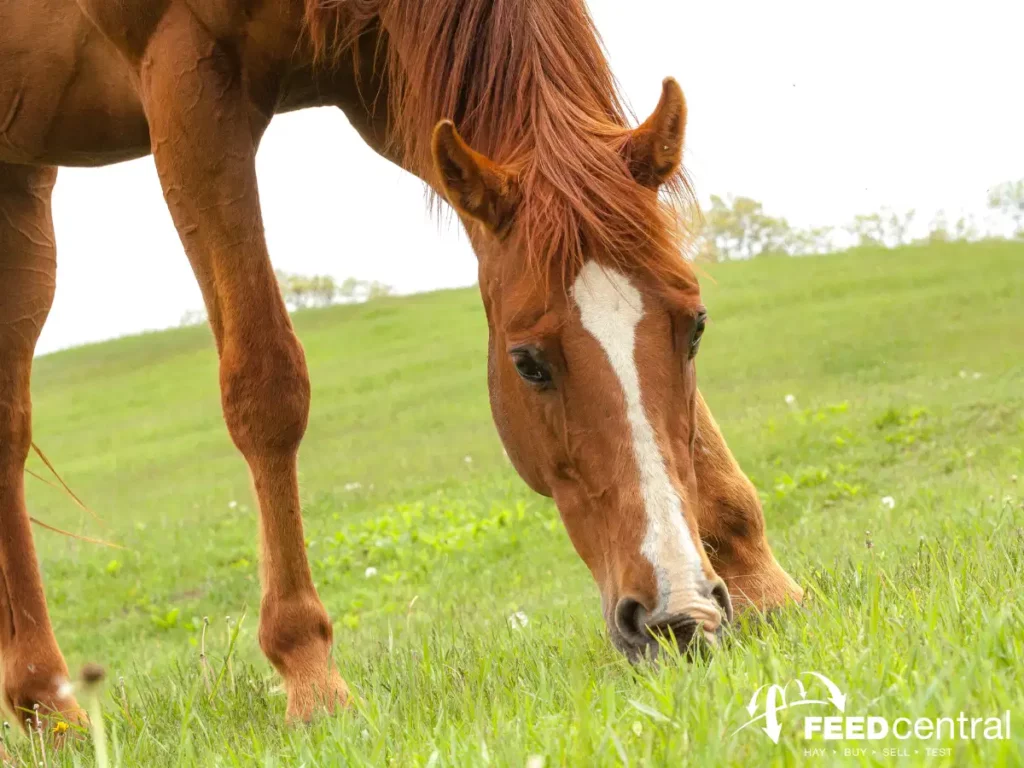Potassium is a mineral that is found in many foods, and it is also necessary for horses. It plays a big role in balancing osmotic pressure, which is essential for cell function. It is also a key component of electrolyte balance, which helps regulate nerve and muscle activity.
Neuromuscular excitability, a process that helps control muscle contraction and nerve firing, is dependent on potassium balance. Low levels of potassium can lead to a weakened or interrupted heartbeat, which can be deadly for horses.
Now, there has been debate on whether or not too much potassium intake by horses, especially from forages and lush pasture grass, can lead to problems.
We researched and put together this comprehensive guide to help you understand potassium balance in horses, the possible risks of over-intake if any, and whether you should worry about the entire debate in the first place.
Is my Horse Taking Too Much Potassium?
If you have horses, you may be wondering if they’re taking in too much potassium. According to the Nuclear Regulatory Commission, there is no major cause for concern even if your horses are feeding on forages and lush pasture grasses.
Potassium is naturally abundant in horses’ diets. The NRC says that it is actually normal for potassium levels in horses to exceed the minimum daily requirement. This means that even if your horse is taking in extra potassium, it may not be an issue.
This is true for 3 major reasons:
1. Most Horse Diets Have Way More Potassium Than Needed
We have analysed various forage-based horse diets and noticed that they contain 5-10 times more potassium than the minimum daily requirement (25-50mg).
Most of these diets have up to 2% potassium. This means that if an average mature horse takes in 10kg of feed a day, it can consume up to 100g of potassium per day. You will notice that most hay and grass feeds have up to 3% potassium. That’s way too much for your horse’s needs, but they still function as normally as if they were taking the recommended amount, don’t they?
2. Excellent Potassium Excretion In Horses
Horses have among the best potassium excretion mechanism. This means that, even if they take in lots of potassium, they can quickly rid their bodies of the excess.
Most of the excess potassium is excreted through the kidneys. And more interestingly, the more potassium your horse takes, the better its excretion mechanism becomes. This is an adaptation that helps horses survive in lush green pastures, as they can take in more potassium without any danger.
When your horse takes too much potassium, excretion will be increased through sweat, faeces, and urine. More specifically, sweat plays a major role in removing excess potassium, as it can contain up to 12-17% of the average amount taken in, depending on the type of feed.
This, however, may lead to potassium deficiency in exercising horses, especially in hot and humid climates.
3. There is No Scientific Evidence of Potassium Deficiency
There has not been any scientific literature that proves that too much potassium intake causes issues in horses. There is also no evidence of any long-term deficiencies resulting from high levels of dietary potassium.
From the above analyses, it follows that the horse’s body is naturally prepared to handle more than the recommended amounts of potassium without any adverse effects.
So, if your horse is taking in more than the recommended levels of dietary potassium, you don’t need to worry too much. Just make sure that it gets enough salt, magnesium, and calcium as well so that its electrolyte balance stays normal.
Are There Any Potassium-Related Health Problems in Horses?
Hyperkalemic periodic paralysis (HYPP) is a condition caused by the genetic mutation of a horse’s muscle cells. This mutation causes horses to be too sensitive to potassium, leading to a condition called hyperkalemia or high potassium levels.
Hyperkalemia can cause serious problems in horses such as muscle weakness, cramps, and even sudden death. This is why it’s important to make sure that your horse has the proper diet and is tested for HYPP before being put into competition.
When your horse has HYPP, it is often recommended that their diet should have no more than 1% potassium. Note that this is still 2-4 times more than what is considered their minimum daily potassium requirement, stressing the fact that too much potassium intake is not a threat to horses.

Should I Feed My Horses Lush Pasture Grass?
We have seen debates on many online platforms about the dangers of feeding horses on lush pasture grass and lucerne hays. People blame all sorts of symptoms, from tying-up to colic and laminitis, on high levels of potassium in the forage.
But like we said earlier, there is no scientific evidence that supports these claims. And while there is high potassium in these feeds, horses can easily rid their bodies of the excess without any health risk.
Interestingly, no veterinary experts specializing in HYPP advise against feeding horses on lush grass or lucerne hay. This, in part, may be due to the fact that lush pasture grass has up to 80% water. This means that the rate at which your horse takes in the potassium in the grass is greatly reduced.
What if My Horse's Serum Potassium Level is High?
While we wouldn’t want to discount the importance of testing your horse’s serum potassium level for any reason, we must mention that many serum potassium level results are not a true reflection of the horse’s potassium levels.
We have had the privilege of working in a pathology laboratory and we can attest to the fact that serum potassium levels can often be affected by blood sample collection and handling errors. Hemolysis, a condition where red blood cells break down, and the subsequent release of potassium into the sample can also affect serum measures.
In other words, a reading of your horse’s serum potassium level may not necessarily indicate their actual intake or excretion of potassium.